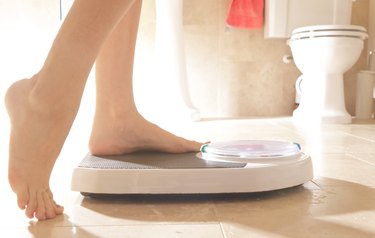
Losing weight can be rough. Even when you think you're doing everything right, sometimes the scale refuses to budge. You might be tempted to fall for fad diets or weight-loss products that promise quick, miraculous results. But if it sounds too good to be true, it probably is. Or, at the very least, it's unsustainable and unhealthy.
If you want to shed the pounds and keep them off, you need to shift your mindset from dieting in the short-term to making long-term lifestyle changes, says Leslie Langevin, author of The Anti-Inflammatory Kitchen Cookbook and owner of Whole Health Nutrition.
Video of the Day
Video of the Day
"Adopting healthy habits may not be easy, but most things in life that are worthwhile take work," says Bonnie Taub-Dix, registered dietitian, creator of BetterThanDieting.com and author of Read It Before You Eat It: Taking You From Label to Table.
With all the opinions out there, it's easy to get overwhelmed and confused. Not to mention, misinformed. So how do you separate fact from fiction and avoid dieting pitfalls?
Here are the most common mistakes people make when trying to lose weight, plus what to do instead to reach your weight-loss goals in a healthy way.
1. Not Planning Meals Ahead of Time
Even the most well-intentioned, disciplined person's weight-loss goals can get derailed by poor planning. When hunger hits and you're not prepared, it's a recipe for bad decisions. Who hasn't eaten cereal for dinner on a busy work day?
To avoid throwing together unhealthy meals or ordering takeout — which can increase your calorie load per day — plan ahead, says Langevin. Each week try planning out three meals, and then hit the grocery store to stock up on the ingredients, so you'll have them on hand when you need them. You'll save yourself the time and headache of figuring out what to eat when you're tired, rushed and hungry.
Another plus of planning? It's a money saver, since you're not spending tons of cash on fast food, says Langevin.
2. Eating Too Few Calories

You might think drastically slashing calories or skipping meals will help you reach your goal weight faster, but under-eating can actually sabotage your efforts to shed the pounds.
Low-calorie diets that have you eating fewer than 1,200 calories a day can slow your metabolism, making it harder to lose weight and putting you at risk for weight gain over time.
So how many calories do you need to lose weight and avoid suppressing your metabolism? The number depends on a bunch of factors including your age, body type and activity level. "Use an online calorie calculator to calculate your daily caloric need, and then subtract 500 calories per day," says Langevin. "This will give you a rough estimate of what you will need to lose one pound per week without starving your body or going below your basal metabolic rate (the energy your body needs at rest)."
People who work out will need to factor in daily exercise too. "With respect to caloric intake, a person's diet and activity levels are inseparable," says Natasha Turner, ND, founder of Clear Medicine Wellness Boutique and author of The Supercharged Hormone Diet. "When you move more, you must eat more, and when you move less, you must eat less."
3. Never, Ever Eating Foods You Like
Just because you're trying to slim down doesn't mean you should swear off ice cream and nachos forever. "If I told you that you could never eat another cookie ever again, wouldn't that make you sad? Wouldn't you want it more?" says Langevin.
To avoid feeling deprived — which might result in binging down the line — you should eat your favorite treats some of the time. But moderation is the key. Langevin recommends an 80/20 balance: Eat healthy whole foods 80 percent of the time and leave the remaining 20 percent for whatever you crave. "Everyone should be able to eat out at a restaurant every once in a while and not worry about calories."
Turner also encourages her clients to have one cheat meal a week because — surprisingly — it can boost your metabolism. "When you reduce overall calories, the body adapts and lowers your metabolism as a survival mechanism," she says. A weekly "cheat meal" prevents hunger and cravings from getting out of control and refuels your muscles' energy stores, which helps you keep pace with your workouts.
4. Compensating for Eating With Exercise

Hate to break it to you, but you're probably not incinerating as many calories at the gym as you think. A December 2010 study in The Journal of Sports Medicine and Physical Fitness found that participants overestimated — by quadruple! — the amount of calories they burned in a sweat session. To make matters worse, this misjudgment led them to consume almost triple the calories they burned during exercise.
So just because you hit spin class hard doesn't mean you can eat whatever you want. Plus, working out just so you can binge on a bag of chips encourages an unhealthy relationship with food, says Langevin. "It's good to have a balanced exercise program, but if you find you are bargaining too much with yourself, be careful."
Instead of eating the chips and penalizing yourself with a backbreaking workout, just budget the chips into your day, says Langevin. For example, if the chips are 300 calories, make a healthy adjustment to your dinner — add more veggies and be sure to include a low-calorie lean protein like fish or chicken.
5. Going It Alone
Dropping pounds can be especially rigorous (not to mention lonely) if you're doing it solo. When it comes to beating the scale, there's strength in numbers. One April 2003 study in JAMA found that Weight Watchers participants shed triple the pounds of people who dieted on their own.
Another August 2016 review of weight-loss studies in Patient Preference and Adherence showed that supervised weight-loss programs were more effective than self-help strategies. Plus, people were more likely to maintain weight loss if they participated with friends or family.
That's because teaming up with others offers a sense of camaraderie and community. Plus, you're less likely to give up when you know someone else is counting on you to show up. This is especially true if you work out with a gym buddy. According to a March 2014 study in BMC Women's Health, accountability to others was among the top motivators for regular exercise in women.
6. Eating 'Diet' Foods
When your goal is weight loss, snacking on "low-fat" food products seems like a no-brainer — but don't be duped. Fat-free peanut butter and ice cream may have fewer calories, but they also have a heap of chemicals, plus extra salt and sugar to compensate for flavor.
In fact, a 2014 analysis by the Telegraph found that some low-fat foods contain as much as five times the sugar as their full-fat counterparts, with one fat-free yogurt boasting the sugar content of a Mars Bar.
And ironically, eating foods marketed as "diet" can also lead to weight gain. That's because people perceive "health food" to be less filling, and therefore eat more, according to a January 2016 study in the Journal of the Association of Consumer Research.
So what should you stock your pantry with instead? Skip the processed food and stick to whole foods containing lots of fiber, healthy fats, lean protein and low-glycemic carbs. And, when in doubt, add veggies. Turner recommends consuming two cups of cooked vegetables twice a day, which will boost your meal's nutrition factor and fill you up with fewer calories.
7. Fixating on the Scale

You might be tempted to weigh yourself every day to see your progress. But that's a bad idea. "Weight can shift a few pounds each day from changes in water in the body," says Langevin, who recommends stepping on the scale only once per week (and not after a high-sodium meal). "Getting frustrated by looking at a scale daily for a small change up or down is not going to help with weight loss, but it may increase guilt or sadness."
Feeling discouraged can easily lead you down a path of emotional eating. Don't let a silly scale derail your momentum! "The scale shouldn't dictate your mood or tell you how you should feel," says Taub-Dix. "The number is only one way of measuring success."
Langevin agrees: If your clothes are fitting better, but the number on the scale isn't moving, don't worry. This happens a lot when people begin to exercise and gain muscle, which takes up less space than fat. Your body may be changing its distribution and losing fat, but the number on the scale won't show it, she says.
8. Misreading Food Labels
Food labels can be deceiving. Just because a product says "natural" or "healthy" doesn't mean it really is. "Beware of flashy fronts of packages," says Taub-Dix. "Foods labels that say 'free-from' something could be high in sugar, salt, calories and fat, and void of value, like fiber, so be sure to flip your package over to see what you're really getting."
Even the nutritional info on the back of a box or bag can be confusing. "The biggest mistake I see is not reading the serving size on individually packed items," says Langevin, adding that a small container may contain two to three servings. That's why you should always check the serving size, so you don't end up eating double or triple the calories and unintentionally sabotaging your efforts.
9. Not Drinking Enough Water

Feeling hungry? Before you reach for a snack, try drinking a glass of water first. "Sometimes we confuse hunger and thirst," says Taub-Dix, which is why it's important to stay hydrated throughout the day to curb unnecessary eating.
"Drinking lots of fluid can help reduce appetite," says Langevin. That's because water takes up space in your stomach, leading you to feel fuller and satiated. One July-December 2014 study in the Journal of Natural Science, Biology, and Medicine found that subjects who drank 500 milliliters of water three times a day — a half hour before breakfast, lunch and dinner — reduced their weight, body fat and appetite.
Another June 2014 study in Acta Physiologica suggests that drinking water may even help you burn more calories. Participants who drank cold water increased their energy expenditure by almost 3 percent in the 90-minute period after ingestion.
So, how much H2O should you knock back? Aim for eight glasses of water per day, says Taub-Dix. And if straight water sounds boring, toss some fruit into your pitcher to add a little flavor or munch on veggies with high-water contents like celery. Seltzer and tea are also healthy hydrating choices.
10. Cutting Out All Carbs Completely
With the popularity of low-carb diets like Atkins, paleo and the most recent keto diet craze, carbs are basically persona non grata. "Carbs are truly the one group that we love to hate," says Taub-Dix.
Though some kinds — the ultra-processed, refined type — deserve the bad rep, complex carbohydrates like sweet potatoes, beans, oats, fruit and quinoa are quite good for you, says Langevin.
"Eliminating carbs as an entire group means that you eliminate essential nutrients like fiber, a nutrient the majority of us don't get enough of as it is, plus a wealth of the vitamins and minerals our bodies need each day," says Taub-Dix.
- Journal of Sports Medicine and Physical Fitness: "Normal weight men and women overestimate exercise energy expenditure"
- JAMA: "Weight Loss With Self-help Compared With a Structured Commercial Program"
- Patient Preference and Adherence: "Weight loss intervention adherence and factors promoting adherence: a meta-analysis"
- BMC Women's Health: "Factors influencing adherence to regular exercise in middle-aged women: a qualitative study to inform clinical practice"
- Telegraph: "Low fat foods stuffed with 'harmful’ levels of sugar"
- Journal of the Association of Consumer Research: "Eating Healthy or Feeling Empty? How the “Healthy = Less Filling” Intuition Influences Satiety"
- Journal of Natural Science, Biology and Medicine: "Effect of excessive water intake on body weight, body mass index, body fat, and appetite of overweight female participants"
- Acta Physiologica: "Cardiovascular and metabolic responses to tap water ingestion in young humans: does the water temperature matter?"


